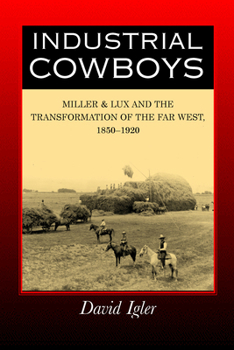Industrial Cowboys: Miller & Lux and the Transformation of the Far West, 1850-1920
Select Format
Select Condition 
Book Overview
Few industrial enterprises left a more enduring imprint on the American West than Miller & Lux, a vast meatpacking conglomerate started by two San Francisco butchers in 1858. Industrial Cowboys examines how Henry Miller and Charles Lux, two German immigrants, consolidated the West's most extensive land and water rights, swayed legislatures and courts, monopolized western beef markets, and imposed their corporate will on California's natural environment. Told with clarity and originality, this story uses one fascinating case study to illuminate the industrial development and environmental transformation of the American West during the late nineteenth and early twentieth centuries. The process by which two neighborhood butchers turned themselves into landed industrialists depended to an extraordinary degree on the acquisition, manipulation, and exploitation of natural resources. David Igler examines the broader impact that industrialism--as exemplified by Miller & Lux--had on landscapes and waterscapes, and on human as well as plant and animal life in the West. He also provides a rich discussion of the social relations engineered by Miller & Lux, from the dispossession of Californio rancheros to the ethnic segmentation of the firm's massive labor force. The book also covers such topics as land acquisition and reclamation, water politics, San Francisco's unique business environment, and the city's relation to its surrounding hinterlands. Above all, Igler highlights essential issues that resonate for us today: who holds the right and who has the power to engineer the landscape for market production?
Format:Paperback
Language:English
ISBN:0520245342
ISBN13:9780520245341
Release Date:January 2005
Publisher:University of California Press
Length:281 Pages
Weight:0.92 lbs.
Dimensions:0.7" x 6.1" x 8.8"
Customer Reviews
1 rating
A path breaking work
Published by Thriftbooks.com User , 18 years ago
This is a fine book that provides important new insights not only into the history of big cattle ranching in California, but also into our broader understanding of the settlement of the American West and the meaning of American industrialization. Igler's concept of the "industrial cowboy" who works, in essence, in a factory without walls in which the landscape of nature itself becomes part of the technological system should force all American historians to rethink their understanding of what constitutes an industrialization. Likewise, Igler's work adds to the growing body of evidence that one of the best ways of defining and thinking about the American West is a place where a relatively pristine environment interesected with an advanced industrial society.





